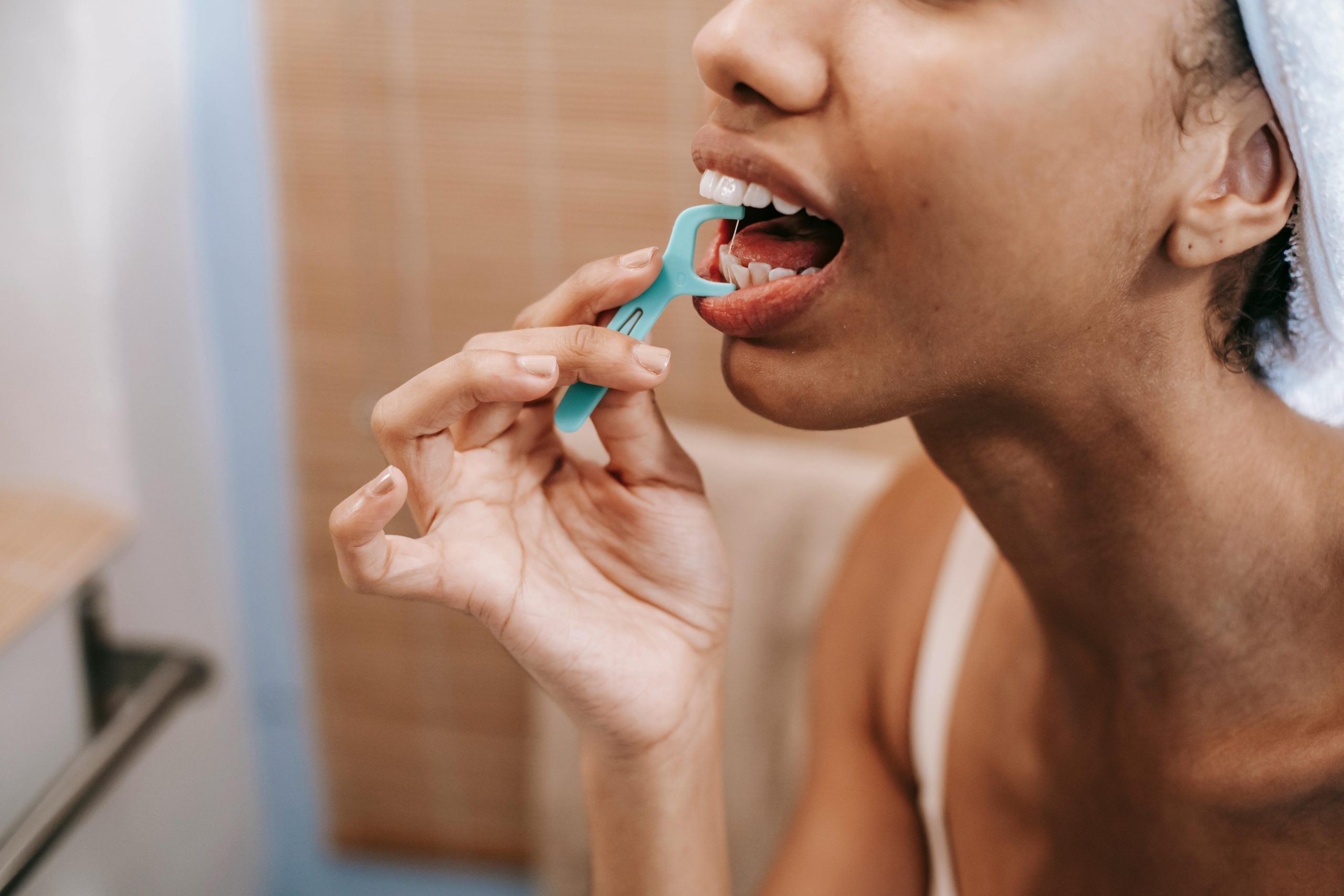
Flossing is one of the most recommended habits by dental professionals, yet many people question how often it should be done. Should you floss after every meal, or is once a day enough? Understanding the role of flossing in oral health can help you make informed decisions to protect your teeth and gums.
Flossing removes plaque and food particles that toothbrushes cannot reach. While brushing cleans tooth surfaces, flossing reaches between teeth and under the gumline, preventing cavities and gum disease.
The Importance of Flossing

Flossing is a small daily effort that delivers major benefits for your oral health:
- Eliminates trapped food: Reaches areas between teeth that brushing alone can’t, preventing decay.
- Controls plaque buildup: Regular flossing stops plaque from hardening into tartar, which requires professional removal.
- Supports gum health: Reduces inflammation, bleeding, and lowers the risk of gingivitis.
- Fights bad breath: Removes bacteria and debris that cause unpleasant odors.
Neglecting flossing can lead to serious dental problems. For those asking what happens if you don’t floss, the consequences include plaque accumulation, cavities, gum disease, and potential tooth loss over time. Regular flossing is a simple step that protects your smile and keeps your mouth healthy.
When Flossing Matters Most
Timing your flossing can make a big difference in protecting your teeth and gums. While daily flossing is essential, certain moments are especially important:
- After meals with sticky or sugary foods: Foods like candy, caramel, or bread can leave residue between teeth. Flossing immediately removes trapped particles and reduces the risk of cavities.
- Before bedtime: Brushing at night alone does not remove all debris from between teeth. Flossing before sleep helps prevent bacteria from sitting on your teeth and gums overnight, which can lead to decay and gum inflammation.
- Before dental visits: If you floss shortly before a checkup, your dentist or hygienist can see healthier gums and a cleaner mouth, making exams and cleanings more effective.
By targeting these key times, you reduce the chance of long-term damage and can maintain a cleaner mouth without having to floss excessively throughout the day. Timing flossing strategically also encourages consistency, turning it from a chore into a natural part of your oral hygiene routine.
Modern Flossing Tools
Flossing no longer has to be limited to traditional string floss. There are multiple options available to suit different lifestyles, dental needs, and personal preferences:
- Traditional floss: Best for tight spaces between teeth. It allows for thorough scraping of plaque and is widely recommended for effective cleaning.
- Floss picks: Convenient for quick use, especially when traveling or at work. They are easier to handle than string floss and can help make flossing a consistent habit.
- Water flossers: These devices use a stream of pressurized water to remove debris. They are particularly useful for people with braces, dental implants, or sensitive gums, providing a gentle yet effective cleaning.
- Interdental brushes: Small, cone-shaped brushes are perfect for cleaning larger gaps between teeth, around dental work, or areas where floss cannot reach effectively.
Choosing the right tool for your teeth and lifestyle improves the likelihood of regular flossing, which is essential in preventing gum disease, cavities, and other issues caused by skipping flossing.
Best Time to Floss
The most effective time to floss is a matter of personal preference:
- Before brushing at night: Removes debris from the day and allows fluoride toothpaste to reach between teeth.
- After breakfast: Can be convenient for busy mornings and reduces food particles left in your mouth.
- Evening flossing: Many dentists recommend flossing before bed to prevent plaque buildup overnight.
Regardless of the time, the key is consistency—flossing every day is more important than multiple times per day.
Tips to Make Flossing a Habit
Many people skip flossing due to forgetfulness or inconvenience. Making it part of your daily routine can ensure long-term oral health:
- Floss at the same time daily, such as before bedtime.
- Keep floss visible near your toothbrush.
- Use flavored or coated floss for a more pleasant experience.
- Track your progress with a calendar or app.
- Consider a water flosser if traditional flossing is challenging.
What to Do If You Haven’t Flossed Regularly
If you’ve neglected flossing for months or years, it’s not too late to take action:
- Schedule a dental cleaning: Remove tartar and plaque that brushing alone cannot handle.
- Start slow: Floss a few teeth at a time if gums bleed, gradually increasing coverage.
- Monitor symptoms: Watch for persistent bleeding, swelling, or bad breath.
- Consult your dentist: Early intervention can prevent irreversible damage.
- Complement with brushing and mouthwash: Use fluoride toothpaste and an antimicrobial rinse to fight bacteria.
Even long-term neglect can be mitigated with professional care and consistent daily flossing.
Foods and Habits That Increase the Need for Flossing

Certain foods and habits make flossing especially important:
- Sticky foods: Caramel, dried fruit, or candy can get stuck between teeth.
- Fibrous foods: Meat or vegetables may leave particles in hard-to-reach spots.
- Sugary drinks: Soda or juice promotes bacteria growth in the gaps between teeth.
- Smoking or tobacco use: Increases plaque and tartar formation.
If you consume these items frequently, consider flossing sooner after eating to reduce decay risk.
Common Mistakes to Avoid
Even regular flossers can make errors that reduce effectiveness:
- Snapping the floss: Can damage gums.
- Flossing too aggressively: Leads to soreness or recession.
- Skipping back teeth: Plaque often accumulates in molars.
- Using the same section repeatedly: Transfers bacteria to other teeth.
- Relying solely on floss: Brushing and mouthwash are also essential.
Correct technique and a consistent routine are crucial for protecting teeth and gums.
Long-Term Effects of Neglect
Skipping flossing even occasionally can have serious consequences over time. Understanding these risks helps highlight why consistency is crucial:
- Plaque buildup: Food particles and bacteria left between teeth form plaque. Over time, this hardens into tartar, which brushing alone cannot remove.
- Gum disease: Gingivitis, an early stage of gum disease, can develop if plaque accumulates. Without intervention, it may progress to periodontitis, causing gum recession, infection, and even tooth loss.
- Tooth decay: Decay often starts between teeth where a toothbrush cannot reach. Flossing removes these hidden particles, lowering the risk of cavities.
- Systemic health risks: Poor oral hygiene has been linked to heart disease, diabetes, respiratory issues, and other systemic problems. Maintaining gum health through flossing contributes to overall wellness.
Even if you’ve neglected flossing for years, starting now and incorporating professional cleanings can help reduce damage and restore oral health. Early action is always more effective than waiting until problems become severe.
Professional Advice
Professional guidance is critical for ensuring your flossing routine is both effective and sustainable:
- Schedule regular checkups and cleanings: Your dentist or hygienist can remove tartar and plaque buildup that daily flossing cannot reach.
- Request personalized techniques: A dental professional can show the correct way to floss for your specific mouth shape, gum sensitivity, or dental work.
- Discuss tools and options: Ask about water flossers, interdental brushes, or specialty floss that may suit your needs better than standard floss.
- Monitor oral health: Dentists can detect early signs of gum disease or cavities that might not be visible, giving you a chance to adjust your flossing routine before serious issues develop.
Working closely with your dental provider ensures that your flossing routine maximizes benefits and prevents the long-term consequences of poor oral hygiene.
Final Thoughts
Flossing is a vital part of oral hygiene, but you don’t necessarily need to floss after every meal. Once daily, done correctly, is sufficient for most people. Flossing helps prevent cavities, gum disease, and other oral health problems, and it complements brushing and mouthwash use.
Understanding what happens if you don’t floss emphasizes its importance—plaque accumulates, gums become inflamed, and dental issues develop over time. For optimal oral health, focus on consistency, proper technique, and integrating flossing into a routine you can maintain for life.
With the right habits, you can maintain healthy teeth and gums, prevent costly dental treatments, and enjoy a confident smile for years to come.

